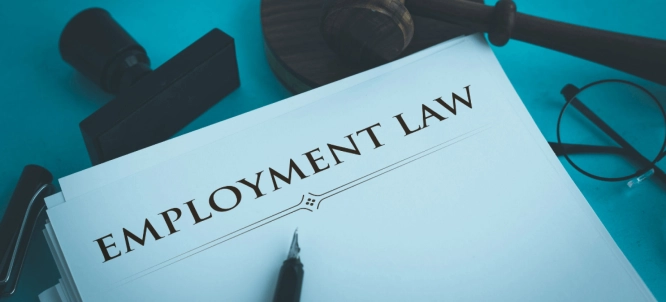by PushtoLearn
Unit 8 - Employment Law
Table of Contents
Unit 8, International Legal English Exercises and Flashcards
These exercises focus on Unit 8, International Legal English
Wordlist for Unit 8, International Legal English
|
Word |
Definition |
Example |
|
termination of employment |
The end of an employment relationship, whether initiated by the employer or the employee |
The termination of employment was abrupt and unexpected, leaving the employee in a state of uncertainty |
|
employment tribunals |
Legal bodies or courts that handle disputes and claims related to employment issues and rights |
Disputes related to unfair dismissal can be brought before employment tribunals to seek resolution |
|
discriminatory dismissal |
The termination of an employee's contract of employment based on discrimination, often unlawfully |
The employee claimed that their termination was a discriminatory dismissal based on their age and filed a complaint |
|
Employment legislation |
Laws and regulations that govern various aspects of the employer-employee relationship and workplace |
Employment legislation is continuously updated to ensure fair treatment and protection for workers in the labor market |
|
sex discrimination |
Unfair treatment or bias based on an individual's gender or sex, which is prohibited by law |
The company has a strict policy against sex discrimination and provides equal opportunities for all employees |
|
race relations |
The interactions, attitudes, and policies concerning different racial or ethnic groups within society |
Promoting positive race relations in the workplace is essential for fostering a diverse and inclusive environment |
|
disability |
A physical or mental condition that substantially limits one's ability to perform certain life activities |
The disability discrimination act prohibits discrimination against individuals with disabilities in employment |
|
terms and conditions of employment |
The specific provisions, rules, and agreements that outline the terms of an employment contract |
The terms and conditions of employment must be clearly communicated to all new hires during the orientation process |
|
genuine occupational qualification |
A valid and necessary job requirement that may justify discrimination based on certain characteristics |
There are limited circumstances where a genuine occupational qualification allows employers to set specific job requirements |
|
date of employment |
The date on which an individual begins working for an employer or the start date of their employment |
The date of employment is essential for calculating the employee's length of service and entitlements |
|
holiday entitlement |
The number of paid vacation days or annual leave days to which an employee is entitled based on employment terms |
Employees are entitled to a specific number of paid leave days per year, in accordance with their holiday entitlement |
|
unfair dismissal |
The termination of an employee's contract without a fair or legal reason, often resulting in legal claims |
The employee claimed that their dismissal was an unfair dismissal and sought reinstatement through legal action |
|
redundancy dismissal |
The termination of an employee's contract due to redundancy or the elimination of their position |
Many employees faced redundancy dismissal due to the company's restructuring efforts during the economic downturn |
|
trade union |
An organization representing the interests and rights of workers in labor-related matters |
The trade union negotiated for better working conditions and secured improved benefits for its members |
|
collective bargaining |
Negotiations between employers and employee representatives, often unions, to establish employment terms |
Collective bargaining between labor unions and management resulted in a new employment contract with favorable terms |
|
arbitration process |
A method of resolving disputes where a neutral third party makes a binding decision based on presented evidence |
The arbitration process is often chosen as an alternative dispute resolution method to avoid lengthy court battles |
|
strike |
A work stoppage or industrial action by employees to protest workplace conditions, often organized by a union |
The employees decided to go on strike to protest against unfair labor practices and demand better wages |
|
picketing |
The act of demonstrating or picketing outside a workplace to raise awareness or advocate for workers' rights |
The striking workers engaged in picketing outside the company premises, peacefully advocating for their rights |
|
injunction |
A court order that requires or prohibits specific actions or behaviors, often used to stop a strike or protest |
The court issued an injunction to prevent the company from taking retaliatory actions against the striking employees |
|
lockout |
An employer-initiated action that involves temporarily barring employees from entering the workplace |
The lockout initiated by the employer halted all work activities until a resolution to the labor dispute was reached |
|
marital status |
An individual's legal status regarding marriage, including being married, single, divorced, or widowed |
The company's non-discrimination policy extends to marital status, ensuring that employees are treated fairly |
|
ethnic origins |
A person's ancestry or cultural heritage, often used in the context of discrimination or equal treatment |
Discrimination based on ethnic origins is strictly prohibited in the workplace, promoting diversity and inclusion |
|
to outlaw something |
To make something illegal or prohibited by law |
The new legislation seeks to outlaw discrimination in all forms, ensuring equal opportunities for everyone |
|
to bring a claim against someone |
To initiate legal proceedings or file a complaint against someone, often in response to perceived wrongdoing |
The employee decided to bring a claim against their former employer for wrongful termination and discrimination |
|
landmark case |
A legal case that establishes new legal precedents or principles and has a significant impact on future cases |
The landmark case set a legal precedent that significantly impacted how employment discrimination cases are handled |
|
discriminatory culture |
A workplace environment or atmosphere that promotes or tolerates discrimination based on certain characteristics |
The company's leadership committed to addressing the discriminatory culture within the organization through diversity training |
|
to waive rights |
to give something up |
The employee chose to waive their rights to legal action by accepting a settlement offer from the employer |
|
to hear a case |
to listen to a case at a relatively formal proceeding |
The employment tribunal will hear the case and make a determination on whether the dismissal was unfair |
|
to plead a case |
to argue a case in court |
The legal team will plead the case on behalf of the employee, presenting evidence of discriminatory practices |
|
to apply a law |
to make use of something (when deciding a case) |
Employers are required to apply the law in their hiring practices, ensuring compliance with anti-discrimination statutes |
|
to appeal a case |
to formally request that a decision of an inferior body be reviewed by a superior one |
If dissatisfied with the tribunal's decision, either party can appeal the case to a higher court for reconsideration |
|
to challenge an award |
to question something |
The employee's legal representative decided to challenge the award, believing it did not adequately compensate the harm suffered |

FAQ
What is termination of employment?
Termination of employment occurs when an employee’s contract ends, either through resignation, dismissal, redundancy, or mutual agreement. Each type of termination carries specific legal implications under employment law.
What are employment tribunals, and what do they do?
Employment tribunals are specialized legal bodies that hear disputes between employers and employees, such as claims of unfair dismissal, discrimination, or redundancy disputes.
What constitutes discriminatory dismissal?
Discriminatory dismissal occurs when an employee is terminated based on a protected characteristic, such as sex, race, disability, or marital status, rather than legitimate grounds.
What is employment legislation?
Employment legislation refers to laws and regulations governing the relationship between employers and employees, including rights, duties, and workplace protections.
What does a "genuine occupational qualification" mean?
A genuine occupational qualification (GOQ) is a legal exception that allows employers to specify certain protected characteristics (e.g., gender, ethnicity) as necessary for a particular job, provided they meet strict criteria.
How does unfair dismissal differ from redundancy dismissal?
Unfair dismissal occurs when an employee is terminated without valid legal grounds or due process, while redundancy dismissal happens due to a lack of work or organizational restructuring.
What is the role of trade unions in employment law?
Trade unions represent employees in collective bargaining with employers, advocating for better pay, working conditions, and resolving disputes.
What is the difference between a strike and a lockout?
A strike is a collective action where employees stop working to protest workplace conditions or demands, while a lockout occurs when employers prevent employees from working to pressure them during disputes.
What is the arbitration process in employment disputes?
The arbitration process involves a neutral third party who hears evidence from both sides in a workplace dispute and provides a binding or non-binding resolution.
What is a landmark case, and why is it important in employment law?
A landmark case is a significant legal decision that sets a precedent, shaping the interpretation and application of employment law for future cases.
What does it mean to waive rights in employment law?
To waive rights means to voluntarily give up certain legal claims or entitlements, often as part of a settlement or agreement.
How is "picketing" different from a strike?
Picketing involves employees protesting outside their workplace, often during a strike, to raise awareness or discourage others from entering.
What is the purpose of an injunction in employment disputes?
An injunction is a court order used to prevent specific actions, such as unlawful strikes or picketing, during an employment dispute.
What does it mean to "apply a law" in employment cases?
Applying a law refers to interpreting and enforcing legal statutes and precedents to resolve a specific employment dispute or issue.
What are the legal grounds to appeal a case in employment law?
A case can typically be appealed if there was an error in applying the law, procedural irregularities, or new evidence that significantly impacts the decision.
What does it mean to "challenge an award"?
Challenging an award refers to disputing the outcome of a legal case or arbitration decision, often through appeal or judicial review.

